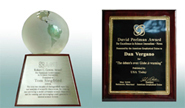19 July 2011
WASHINGTON—A veteran science writer who has frequently reported about the Earth and space sciences over a period of decades with a remarkable blend of accessibility, accuracy, and excellence—Charles W. Petit—has won the 2011 Robert C. Cowen Award for Sustained Achievement in Science Journalism. For outstanding news reporting in 2010 about the Earth and space sciences, AGU awards Steve Connor, science editor of The Independent newspaper of London, U.K., the 2011 David Perlman Award for Excellence in Science Journalism – News for his 24 December 2010 article on a scientific finding suggesting that global warming could result in colder, harsher winters, for a few decades, in the UK and elsewhere in Europe.

With the Cowen Award, given no more often than every 2 years, AGU recognizes a journalist for “significant, lasting, and consistent contributions to accurate reporting or writing” on the Earth and space sciences for the general public.
In recommending Petit for the honor, the Cowen Award committee lauds “the outstanding quality of Petit’s work … in articles written throughout his career.” For instance, in the 1980s and 1990s, Petit covered earthquakes for theSan Francisco Chronicle and wrote “exceptionally clear articles summarizing scientific results amidst the confusion of the early aftermaths of California’s 1989 Loma Prieta and 1994 Northridge earthquakes,” the committee notes.
The committee finds Petit’s reporting on AGU sciences just as strong today, citing as an example the “engaging and accessible style” of a 2010 story Petit wrote for Science News on huge slabs of rock, called cratons, that extend deep into the earth and form the hearts of continents.
AGU previously honored Petit in 2003, recognizing him with the David Perlman award for an exceptional article about a new finding in oceanography. (Perlman, a well-known San Francisco Chronicle science reporter for whom the award is named, was Petit’s colleague at the newspaper for 25 years.)
As highly accomplished as Petit has been at Earth and space science reporting, there are also other ways in which he has made extraordinary contributions to science journalism that his Cowen Award is meant to recognize. Most notably, Petit has since 2006 not only freelanced, but also served as “head tracker” for the Knight Science Journalism Tracker, a blog based out of MIT that compiles and critiques the daily offerings of science reporters worldwide. In his tracker role, Petit has “provided a unique service to the science writing and reading community,” writes the Cowen Award committee.
The Robert C. Cowen Award is named for a former science editor of The Christian Science Monitor, who was the first winner, and it comes with a presentation piece.
The Perlman Award recognizes work published with deadline pressure of one week or less. Steve Connor receives the 2011 award for his story “Expect More Extreme Winters Thanks to Global Warming, say scientists”. The article discusses a computer modeling study, which found that sea-ice losses north of Scandinavia and Russia from global warming could paradoxically create conditions for unusually harsh, cold winters in the UK and elsewhere–much like the UK has recently experienced.
Describing the qualities of Connor’s article that earned it the 2011 award, the Perlman Award committee noted that the article is “not only well-written but also stands out because it (a) brings public attention to an apparent paradox and in doing so corrects misconceptions about AGU science, (b) features science reporting superior to that found in many climate-change articles, and (c) is well linked to daily life making it accessible to a general audience.”
The Perlman Award consists of a plaque and a $5,000 stipend.
These AGU journalism awards will be presented at the Honors Ceremony of the 2011 AGU Fall Meeting in San Francisco. The evening ceremony will take place on Wednesday, 7 December. AGU is not awarding the Walter Sullivan Award for Excellence in Science Journalism-Features this year, upon recommendation of the Sullivan Award committee. AGU expects to present the Sullivan Award again in 2012.
AGU is the world’s largest organization of Earth and space scientists, with more than 60,000 members in 148 counties. AGU encourages excellence in reporting science news to the general public through journalism awards, mass media fellowships, communications workshops for scientists, and other programs.
Joan Buhrman,
Manager, Strategic Communications
Phone: 202-777-7509 (work), 571-213-3812 (cell), Email: [email protected]
Charles Petit: [email protected], +1 510 524 2317
Steve Connor: [email protected], + 44 207 005 2867